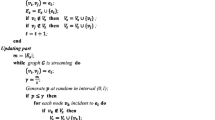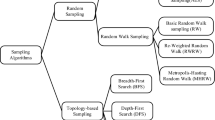Abstract
Recently, there has been growing interest in social network analysis. Graph models for social network analysis are usually assumed to be a deterministic graph with fixed weights for its edges or nodes. As activities of users in online social networks are changed with time, however, this assumption is too restrictive because of uncertainty, unpredictability and the time-varying nature of such real networks. The existing network measures and network sampling algorithms for complex social networks are designed basically for deterministic binary graphs with fixed weights. This results in loss of much of the information about the behavior of the network contained in its time-varying edge weights of network, such that is not an appropriate measure or sample for unveiling the important natural properties of the original network embedded in the varying edge weights. stochastic graphs, in which weights associated with the edges are random variables, can be a suitable model for complex social network. In this paper, according to the principle that Social networks are one of the cases where the distribution of links to nodes is according to the power law that we proposed Levy's initial flight automation sampling algorithm for random graphs, which is a good model for complex social networks. Using Levy Flight instead of gait-based learning that guarantees part of the solution is not separate from the present solution, therefore, it endores an optimizer tolerance, local optimal tolerance, and early convergence. In order to study the performance of the proposed sampling algorithms, several experiments are conducted on real and synthetic stochastic graphs. These algorithms ‘performance is evaluated based on the relative cost, Kendall correlation coefficient, Kolmogorov–Smirnov D statistics, and relative error.






Similar content being viewed by others
References
Izenman, Julian A (2021) Sampling algorithms for discrete markov random fields and related graphical models. J Am Statist Association, 1–58.
Yousuf, Irfan M, Anwer I, Anwar R. (2021) Empirical characterization of graph sampling algorithms. arXiv preprint.
Ghavipour, Mina, Meybodi MR (2021) A dynamic sampling algorithm based on learning automata for stochastic trust networks. Knowledge-Based Syst. 212: 106620.
Roohollahi S, Khatibi Bardsiri A, Keynia F (2020) Using an evaluator fixed structure learning automata in sampling of social networks. J AI Data Mining 8(1): 127–148.
Hens C, et al (2019) Spatiotemporal signal propagation in complex networks. Nat Phys 1.
Papagelis M, Das G, Koudas N (2013) Sampling online social networks. IEEE Trans Knowl Data Eng 25(3):662–676
Murai F et al (2013) On set size distribution estimation and the characterization of large networks via sampling. IEEE J Sel Areas Commun 31(6):1017–1025
Rezvanian A et al (2019) Social network sampling. Learning Automata Approach for Social Networks. Springer, pp 91–149
Adamic LA et al (2001) Search in power-law networks. Phys Rev E 64(4):046135
Wang R et al (2019) Optimising discrete dynamic berth allocations in seaports using a Levy Flight based meta-heuristic. Swarm Evol Comput 44:1003–1017
Pathak Y, Arya K, Tiwari S (2019) Feature selection for image steganalysis using levy flight-based grey wolf optimization. Multimedia Tools Appl 78(2):1473–1494
T Niranjan, P Parthiban (2019) Modelling and analysing an integrated multi channel food supply chain distribution of an indian dairy firm using modified TLBO algorithm.
Emary E, Zawbaa HM, Sharawi M (2019) Impact of Lèvy flight on modern meta-heuristic optimizers. Appl Soft Comput 75:775–789
Butt AA, et al (2019) Optimization of response and processing time for smart societies using particle swarm optimization and levy walk. in International Conference on Advanced Information Networking and Applications. Springer.
Chattopadhyay S, Das AK, Ghosh K (2019) Finding patterns in the degree distribution of real-world complex networks: going beyond power law. Pattern Analy Appl. https://doi.org/10.1007/s10044-019-00820-4
Kwong HS, Nadarajah S (2019) A note on “Pareto tails and lognormal body of US cities size distribution.” Phys A 513:55–62
Khomami MMD, Rezvanian A, Meybodi MR (2016) Distributed learning automata-based algorithm for community detection in complex networks. Int J Mod Phys B 30(8):1650042
Thathachar M, Harita BR (1987) Learning automata with changing number of actions. IEEE Trans Syst Man Cybern 17(6):1095–1100
Isella L et al (2011) What’s in a crowd? Analysis of face-to-face behavioral networks. J Theor Biol 271(1):166–180
Leskovec J, Kleinberg J, Faloutsos C (2007) Graph evolution: densification and shrinking diameters. ACM Transac Knowled Discovery from Data (TKDD) 1(1):2
Erdos P (1960) On the evolution of random graphs. Publ Math Institute Hungarian Academy Sci 5:17–61
Watts DJ, Strogatz SH (1998) Collective dynamics of ‘small-world’networks. Nature. https://doi.org/10.1126/science.286.5439.509
Barabási AL, Albert R (1999) Emergence of scaling in random networks. Science 286(5439):509–512
Rezvanian A, Meybodi MR (2017) A new learning automata-based sampling algorithm for social networks. Int J Commun Syst 30:e3091
Rezvanian A, Meybodi MR (2015) Sampling social networks using shortest paths. Phys A 424:254–268
Rezvanian A, Rahmati M, Meybodi MR (2014) Sampling from complex networks using distributed learning automata. Phys A 396:224–234
Jalali ZS, Rezvanian A, Meybodi MR (2016) Social network sampling using spanning trees. Int J Mod Phys C 27:1650052
Yoon S, Lee S, Yook SH, Kim Y (2007) Statistical properties of sampled networks by random walks. Phys Rev E 75:046114
Kurant M, Markopoulou A, Thiran P (2010) On the bias of BFS (Breadth First Search), In: 2010 22nd International Teletraffic Congress (ITC), pp. 1–8.
Frank O (2011) Survey sampling in networks, in: The SAGE Handbook of Social Network Analysis, SAGE publications, pp. 370–388.
Yoon S-H, Kim K-N, Hong J, Kim S-W, Park S (2015) A community-based sampling method using DPL for online social networks. Inf Sci 306:53–69
Luo P, Li Y, Wu C, Zhang G (2015) Toward cost-efficient sampling methods. Int J Mod Phys C 26:1550050
Blagus N, Šubelj L, Weiss G, Bajec M (2015) Sampling promotes community structure in social and information networks. Phys A 432:206–215
Author information
Authors and Affiliations
Corresponding author
Additional information
Publisher's Note
Springer Nature remains neutral with regard to jurisdictional claims in published maps and institutional affiliations.
Rights and permissions
About this article
Cite this article
Roohollahi, S., Khatibi Bardsiri, A. & Keynia, F. Sampling in weighted social networks using a levy flight-based learning automata. J Supercomput 78, 1458–1478 (2022). https://doi.org/10.1007/s11227-021-03905-2
Accepted:
Published:
Issue Date:
DOI: https://doi.org/10.1007/s11227-021-03905-2




